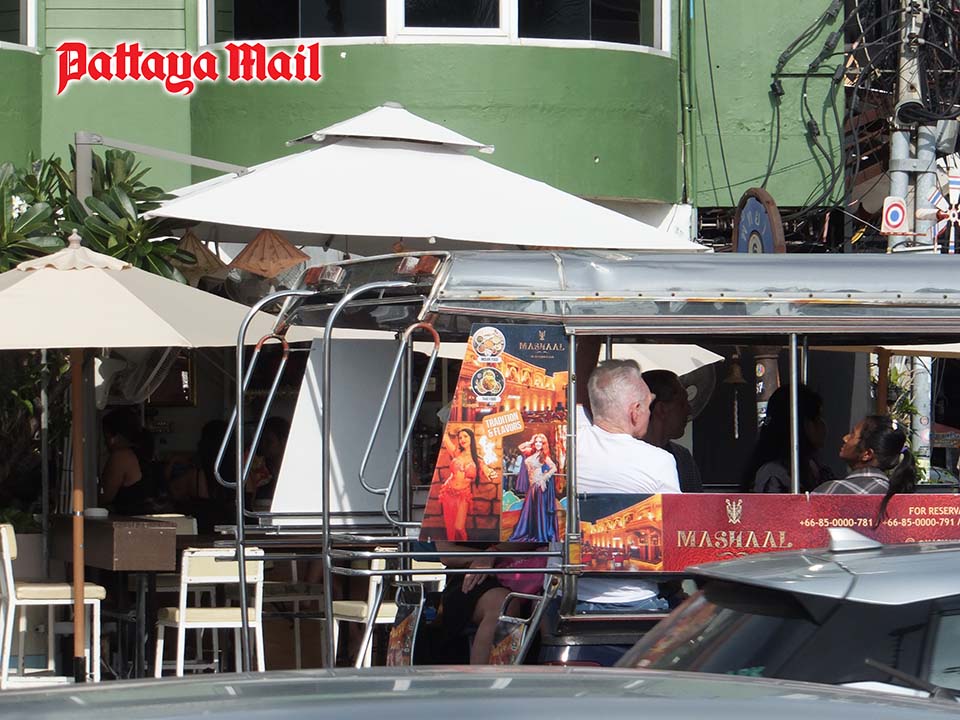As Indian tour groups rise and Chinese visitors decline, European tourists ask—has Pattaya forgotten us?
Is Pattaya losing its identity in the push for volume tourism? European visitors feel squeezed amid Indian influx.
PATTAYA, Thailand – Pattaya is undergoing a transformation that many long-term foreign residents say is making the city unrecognizable. At the heart of the concern is the city’s increasing focus on Indian tourism—particularly low-cost group packages—which expats claim is shifting the local culture, aesthetics, and even the hospitality industry itself.
“I’ve been here for over 15 years, and I barely recognize the place anymore,” wrote one user on a social media platform. “It used to be international. Now it feels like a budget version of Mumbai.”
Expats say Walking Street is just the most visible sign of a larger shift: Indian restaurants and pubs dominate many parts of town; hotels and bars are now catering to Indian group tours rather than independent travelers or couples; and loud, choreographed Bollywood music often replaces Western hits at popular nightlife venues.
The resentment isn’t only cultural—it’s economic. “The quality of tourists has gone down,” another commenter posted. “They spend less, demand more, and contribute to overcrowding.” Some business owners echo that sentiment, claiming the focus on low-budget volume tourism from India has driven prices down and put pressure on the kind of small, Western-style businesses that once thrived in the city.
Amid this shift, European tourists—once the bread and butter of Pattaya’s international appeal—are increasingly feeling neglected. Many report a noticeable decline in tailored offerings: fewer European restaurants, less English-language service, and a sense that Western long-stayers and repeat visitors are no longer a priority.
“It used to be that you’d see French bakeries, German beer gardens, and Scandinavian cafes on every corner,” says a European retiree who has wintered in Pattaya for over a decade. “Now they’re either shut or hanging on by a thread. The new businesses don’t care if you’re from Berlin or Birmingham—they care about whether you’re coming in a tour bus with 30 others.”
This sidelining comes at a delicate time. The once-booming Chinese tourism market has not yet recovered to pre-pandemic levels, and despite government efforts to revive it, high costs, geopolitical tensions, and visa hurdles continue to dampen Chinese arrivals. Meanwhile, Indian tourism—now accounting for the largest share of incoming foreign visitors—is being aggressively courted with group deals, domestic-style eateries, and promotional events.
Yet the numbers don’t always tell the full story. While Indian tourist volume is high, per-capita spending often lags behind that of European travelers. “European tourists, especially retirees or long-term visitors, spend consistently and support a wide range of local businesses—from restaurants to dental clinics,” says one local business operator. “But those businesses are now struggling because group tours don’t touch them.”
Some longtime residents point out that every era of Pattaya has had its own dominant tourist group—from Americans in the 1980s and Europeans in the 1990s to Russians in the early 2000s and Chinese more recently. “Tourism evolves. Maybe this is just the new cycle,” one user commented. Another added bluntly, “The Chinese are gone, the Indians are here to stay, Europeans seem caught in the middle.”
Still, online comment sections are filled with laments and sarcasm:
“Why not just rename it Little India and get it over with?”
“So long as the money keeps flowing, the culture doesn’t matter.”
“Indian tourists deserve to be here like anyone else. But it feels like the city is trying too hard to please them exclusively.”
Some expats suggest city officials should strike a better balance. “Nobody’s asking to ban Indian tourists,” one commenter clarified. “We’re asking for inclusive planning—don’t lose what made Pattaya great for everyone.”
To that end, tourism operators are beginning to take note. There are growing calls from local business associations to diversify marketing strategies and bring back higher-spending Western tourists. Some hotels are quietly launching European-focused packages again, and a few local bars have returned to offering live rock bands and pub quizzes aimed at the Western crowd. But for now, these feel more like isolated gestures than a real policy pivot.
Whether this is a temporary phase or the start of a permanent realignment, one thing is clear: the soul of Pattaya is being debated more fiercely than ever, and not everyone feels heard in the process.



